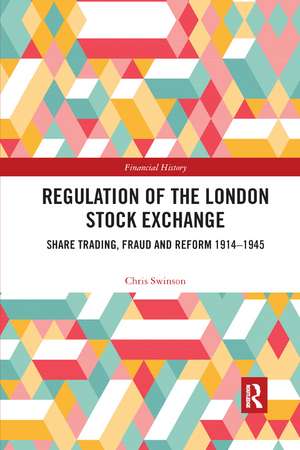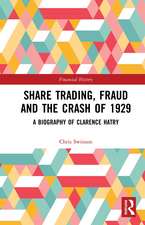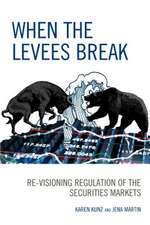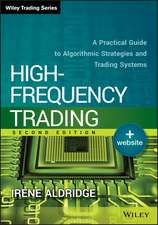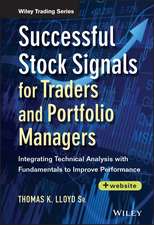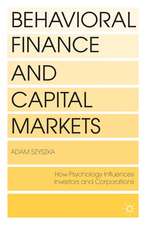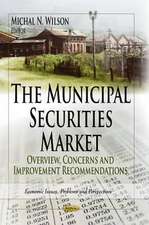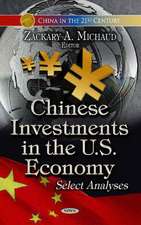Regulation of the London Stock Exchange: Share Trading, Fraud and Reform 1914�1945: Financial History
Autor Chris Swinsonen Limba Engleză Paperback – 12 dec 2019
- Track the steps by which this outcome came about,
- Explain why the Exchange felt obliged in the process to abandon long-cherished policies,
- Analyse the forces which led to it, and
- Account for the form in which it was implemented.
Throughout the period, the attitudes of both the Stock Exchange and Government were affected by widening interest in share ownership, the increasing tendency for business interests to look to the Exchange for long-term finance, and the increasing challenge of financing the Government’s expenditure. At a disaggregated level, the market was able to respond to changing circumstances taking advantages of opportunities and weaknesses. At an aggregated level, the Exchange was not able to foresee the implications of change or to forestall unfortunate consequences. This exposed the weakness of the criminal justice system and its failure to serve as a deterrent for abuse.
This study, the only book to take full account of the documents held by the National Archives in relation to the Bodkin Committee, examines the stages by which share trading in the United Kingdom came to be a statutorily regulated activity and by which the London Stock Exchange moved from being antagonistic towards public regulation in 1914 to lobbying in 1944 for the new scheme to be implemented.
| Toate formatele și edițiile | Preț | Express |
|---|---|---|
| Paperback (1) | 385.84 lei 6-8 săpt. | |
| Taylor & Francis – 12 dec 2019 | 385.84 lei 6-8 săpt. | |
| Hardback (1) | 765.45 lei 6-8 săpt. | |
| Taylor & Francis – 4 dec 2017 | 765.45 lei 6-8 săpt. |
Din seria Financial History
-
 Preț: 312.13 lei
Preț: 312.13 lei -
 Preț: 489.26 lei
Preț: 489.26 lei -
 Preț: 449.41 lei
Preț: 449.41 lei - 26%
 Preț: 846.09 lei
Preț: 846.09 lei -
 Preț: 449.41 lei
Preț: 449.41 lei -
 Preț: 489.26 lei
Preț: 489.26 lei -
 Preț: 445.89 lei
Preț: 445.89 lei -
 Preț: 449.41 lei
Preț: 449.41 lei -
 Preț: 489.26 lei
Preț: 489.26 lei - 31%
 Preț: 765.45 lei
Preț: 765.45 lei -
 Preț: 449.41 lei
Preț: 449.41 lei -
 Preț: 449.41 lei
Preț: 449.41 lei -
 Preț: 329.88 lei
Preț: 329.88 lei -
 Preț: 449.41 lei
Preț: 449.41 lei -
 Preț: 329.88 lei
Preț: 329.88 lei -
 Preț: 449.41 lei
Preț: 449.41 lei - 18%
 Preț: 1108.73 lei
Preț: 1108.73 lei -
 Preț: 449.41 lei
Preț: 449.41 lei -
 Preț: 449.41 lei
Preț: 449.41 lei -
 Preț: 449.41 lei
Preț: 449.41 lei -
 Preț: 449.41 lei
Preț: 449.41 lei -
 Preț: 449.41 lei
Preț: 449.41 lei -
 Preț: 323.23 lei
Preț: 323.23 lei -
 Preț: 449.41 lei
Preț: 449.41 lei - 18%
 Preț: 1107.16 lei
Preț: 1107.16 lei - 18%
 Preț: 1053.92 lei
Preț: 1053.92 lei -
 Preț: 449.41 lei
Preț: 449.41 lei -
 Preț: 449.41 lei
Preț: 449.41 lei - 26%
 Preț: 765.43 lei
Preț: 765.43 lei
Preț: 385.84 lei
Nou
Puncte Express: 579
Preț estimativ în valută:
73.84€ • 80.18$ • 62.02£
73.84€ • 80.18$ • 62.02£
Carte tipărită la comandă
Livrare economică 22 aprilie-06 mai
Preluare comenzi: 021 569.72.76
Specificații
ISBN-13: 9780367887568
ISBN-10: 0367887568
Pagini: 256
Dimensiuni: 156 x 234 x 14 mm
Greutate: 0.36 kg
Ediția:1
Editura: Taylor & Francis
Colecția Routledge
Seria Financial History
Locul publicării:Oxford, United Kingdom
ISBN-10: 0367887568
Pagini: 256
Dimensiuni: 156 x 234 x 14 mm
Greutate: 0.36 kg
Ediția:1
Editura: Taylor & Francis
Colecția Routledge
Seria Financial History
Locul publicării:Oxford, United Kingdom
Public țintă
Postgraduate and UndergraduateCuprins
Table of contents
List of tables
List of charts
Abbreviations
Acknowledgements
Chapter One
Introduction
Chapter Two
Coming to terms with change
Chapter Three
The demand for securities 1914-1945
Chapter Four
The supply of securities 1914-1945
Chapter Five
The Exchange’s marketplace 1914-1945
Chapter Six
Forced into partnership 1914-1918
Chapter Seven
Leave it to the Exchange 1919-1929
Chapter Eight
On the brink of the abyss 1929
Chapter Nine
Managing the Hatry crisis
Chapter Ten
Towards another boom 1930-1936
Chapter Eleven
Negotiating a new partnership 1936-1939
Chapter Twelve
Surviving another war 1939-1945
Chapter Thirteen
Reflections
Index
Notă biografică
Chris Swinson is one of the country's leading experts on corporate accountancy and auditing, acting as an expert witness in litigation concerning auditing negligence, usually in the respect of fraud.
Recenzii
'Regulation of the London Stock Exchange is a colourful and carefully researched account of the activities of unscrupulous and sometimes notoriously fraudulent share dealers and the often-conflicting attempts of Stock Exchange and Government to balance independence and public interest protection.' — Professor Steven Toms, University of Leeds.
Descriere
This study examines the stages by which share trading in the United Kingdom came to be a statutorily regulated activity and by which the London Stock Exchange moved from being antagonistic towards public regulation in 1914 to lobbying in 1944 for the new scheme to be implemented.
